|
|
|
Sort Order |
|
|
|
Items / Page
|
|
|
|
|
|
|
| Srl | Item |
| 1 |
ID:
116224
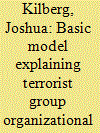

|
|
|
|
|
| Publication |
2012.
|
| Summary/Abstract |
Terrorist groups strive to balance efficiency with their need for security. This article examines the factors that affect a group's choice of organizational structure. I classify 254 groups from the Global Terrorism Database into one of four basic structures: market, all-channel, hub-spoke, or bureaucracy. The results of a multinomial logistic regression reveal that as secret organizations, terrorist groups are not just driven by achieving efficiencies in their organization but rather by protecting against infiltration and threats. Internal factors such as target selection, operational pace, ideology, and stated goals shape a group's structure. External environmental factors such as political rights, civil liberties, polity durability, and state wealth also help shape a group's structure.
|
|
|
|
|
|
|
|
|
|
|
|
|
|
|
|
| 2 |
ID:
126974
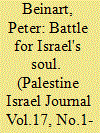

|
|
|
|
|
| Publication |
2011.
|
| Summary/Abstract |
Israeli activists must connect with young, secular American Jews through a liberal Zionism that allows for criticism of Israeli policy. Peter Beinart is senior political writer at the blog The Daily Beast, associate professor of journalism and political science at the City University of New York and a Schwartz Senior Fellow at the New America Foundation. This article is based on his keynote address to the New Israel Fund conference in Tel Aviv-Jaffa held on June 28, 2010 under the heading `The Only Democracy in the Middle East? A Battle for Israel ~ Soul
|
|
|
|
|
|
|
|
|
|
|
|
|
|
|
|
| 3 |
ID:
103302
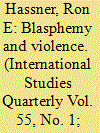

|
|
|
|
|
| Publication |
2011.
|
| Summary/Abstract |
Why did riots in response to the 2005 Danish cartoons depicting the Prophet Muhammad occur in nine Muslim states but not in 43 other states in which Muslims form a majority of the population? I show that the location of the cartoon riots is best explained by combining insights from the study of politics with arguments from the sociology of religion. Protests were mobilized by radical Islamist movements alarmed by the moral threat posed by the blasphemous cartoons. In states characterized by political rights and civil liberties, regimes responded haphazardly to the demonstrations, leading to confrontations between security forces and angry rioters. This finding can be generalized beyond the Muslim world: We should expect reactive religious violence wherever fundamentalist movements are confronted by transgressive acts, committed by threatening opponents, in a political environment that permits protest but fails to protect the religious principles of the movement.
|
|
|
|
|
|
|
|
|
|
|
|
|
|
|
|
| 4 |
ID:
132533
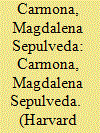

|
|
|
|
|
| Publication |
2014.
|
| Summary/Abstract |
The rapid manner in which social protection systems have gained prominence and political support in development and poverty reduction discourse over the past few years is practically without precedent, leading some to consider it "a quiet revolution." Latin American countries have been at the forefront of this "revolution," with political support for government-funded social protection mechanisms going hand in hand with a growing discourse in favor of a human rights approach in development agendas. This approach is in line with the constitutions of most Latin American countries (including Argentina, Bolivia, Ecuador, Colombia, Guatemala, and Brazil), which enshrine a long list of human rights and explicitly recognize that these norms impose limits on state power. This constitutional protection of rights includes not only civil and political rights, but a wide range of economic, social, and cultural rights (see e.g. the constitutions of Colombia, Brazil, and Costa Rica), the prohibition of discrimination (on the grounds of gender, age, ethnicity, disability, sexual orientation, health status, and others), and the obligation to take affirmative action to protect groups that have suffered from structural discrimination (see e.g. constitution of Ecuador).
|
|
|
|
|
|
|
|
|
|
|
|
|
|
|
|
| 5 |
ID:
131659
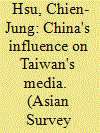

|
|
|
|
|
| Publication |
2014.
|
| Summary/Abstract |
The warming cross-Taiwan Strait relationship has allowed China greater opportunities to influence Taiwan's media. Three interrelated strategies-greater economic control over media outlets, pressure exerted on media owners, and the purchase of influential advertisements-have led to growing concerns about the erosion of press freedoms in Taiwan.
|
|
|
|
|
|
|
|
|
|
|
|
|
|
|
|
| 6 |
ID:
121133
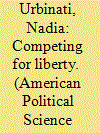

|
|
|
|
|
| Publication |
2012.
|
| Summary/Abstract |
Freedom as non-domination has acquired a leading status in political science. As a consequence of its success, neo-roman republicanism also has achieved great prominence as the political tradition that delivered it. Yet despite the fact that liberty in the Roman mode was forged not only in direct confrontation with monarchy but against democracy as well, the relationship of republicanism to democracy is the great absentee in the contemporary debate on non-domination. This article brings that relationship back into view in both historical and conceptual terms. It illustrates the misrepresentations of democracy in the Roman tradition and shows how these undergirded the theory of liberty as non-domination as a counter to political equality as a claim to taking part in imperium. In so doing it brings to the fore the "liberty side" of democratic citizenship as the equal rights of all citizens to exercise their political rights, in direct or indirect form.
|
|
|
|
|
|
|
|
|
|
|
|
|
|
|
|
| 7 |
ID:
130442
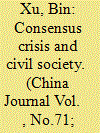

|
|
|
|
|
| Publication |
2014.
|
| Summary/Abstract |
Consensus crisis and civil society: the Sichuan earthquake response and state-society relations
A consensus crisis is characterized by challenges to the state's managerial capacity, a critical need for civil society's services, a general agreement on priorities and goals, and the state's efforts to construct a morally respectable image. These features amplify the structural conditions favorable for relatively amicable state-society interactions. Existing studies of social response to the 2008 Sichuan earthquake focus on state-society relations, but neglect the role of situations. I argue that the earthquake is an example of a consensus crisis, which provided civil associations with a situational opening of political opportunity.
|
|
|
|
|
|
|
|
|
|
|
|
|
|
|
|
| 8 |
ID:
186884
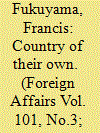

|
|
|
| 9 |
ID:
118870
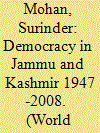

|
|
|
| 10 |
ID:
116106
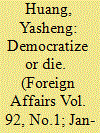

|
|
|
|
|
| Publication |
2013.
|
| Summary/Abstract |
In 2011, standing in front of the Royal Society (the British academy of sciences), Chinese Premier Wen Jiabao declared, "Tomorrow's China will be a country that fully achieves democracy, the rule of law, fairness, and justice. Without freedom, there is no real democracy. Without guarantee of economic and political rights, there is no real freedom." Eric Li's article in these pages, "The Life of the Party," pays no such lip service to democracy. Instead, Li, a Shanghai-based venture capitalist, declares that the debate over Chinese democratization is dead: the Chinese Communist Party (CCP) will not only stay in power; its success in the coming years will "consolidate the one-party model and, in the process, challenge the West's conventional wisdom about political development." Li might have called the race too soon.
|
|
|
|
|
|
|
|
|
|
|
|
|
|
|
|
| 11 |
ID:
052074
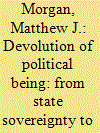

|
|
|
| 12 |
ID:
130825
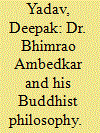

|
|
|
|
|
| Publication |
2014.
|
| Summary/Abstract |
Early Life
Bhimrao Ramji Ambedkar was born on I4 April 1891, popularly also known as Babasaheb, was an Indian jurist, politician, philosopher. anthropologist, historian and economist. A revivalist for Buddhism in India, he inspired the Modern Buddhist movement. As independent India's first law minister, he was the principal architect of the Constitution of India. Born into a poor Mahar family, Ambedkar campaigned against social discrimination, the Indian caste system. He converted himself to Buddhism and is also credited with providing a spark for the conversion of hundreds of thousands of lower caste members to Buddhism. Ambedkar was posthumously awarded the Bharat Ratna, India's highest civilian award, in 1990. Having earned a law degree and doctorates for his study and research in law, "economics and political science from Columbia University and the London School of Economics, Ambedkar gained high reputation as a scholar and practiced law for a few years, later campaigning by publishingjoumals advocating political rights and social freedom for India's untouchables. He is regarded as a Bodhisattva by some Indian Buddhists. though he never claimed it himself.
|
|
|
|
|
|
|
|
|
|
|
|
|
|
|
|
| 13 |
ID:
027045
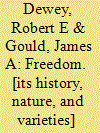

|
|
|
|
|
| Publication |
London, Macmillan, 1970.
|
| Description |
388p.
|
|
|
|
|
|
|
|
|
|
|
|
Copies: C:1/I:0,R:0,Q:0
Circulation
| Accession# | Call# | Current Location | Status | Policy | Location |
| 004405 | 323/DEW 004405 | Main | On Shelf | General | |
|
|
|
|
| 14 |
ID:
112798
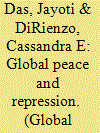

|
|
|
|
|
| Publication |
2012.
|
| Summary/Abstract |
Past research and historical events suggest that the relationship between the peacefulness of a country and the degree of political and civil liberties afforded to its citizens has an inverted U-shape relationship such that the greatest unrest is observed at an intermediate level of freedom. Using the Global Peace Index (GPI), developed by the Institute for Economics and Peace (2010) in collaboration with the Economist Intelligence Unit, this study empirically tests this relationship and the results offer support for this nonlinear relationship. It is argued that while highly repressed societies experience a 'controlled' peace, highly free societies also experience peace stemming from the basic freedoms such as the right to expression and assembly and participation in policy creation. Alternatively, when political and civil freedoms are at some intermediate level, the freedoms offered may not be strong enough to serve as a substitute for protest, yielding greater conflict, crime, and less peace. Policy implications of the findings are also offered.
|
|
|
|
|
|
|
|
|
|
|
|
|
|
|
|
| 15 |
ID:
129926
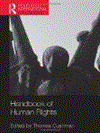

|
|
|
|
|
| Edition |
2nd ed.
|
| Publication |
Oxon, Routledge, 2012.
|
| Description |
xxiii, 744p.Hbk
|
| Standard Number |
9780415480239
|
|
|
|
|
|
|
|
|
|
|
|
Copies: C:1/I:0,R:1,Q:0
Circulation
| Accession# | Call# | Current Location | Status | Policy | Location |
| 057710 | 323/CUS 057710 | Main | On Shelf | Reference books | |
|
|
|
|
| 16 |
ID:
128534
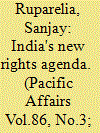

|
|
|
|
|
| Publication |
2013.
|
| Summary/Abstract |
Since 2004, India has introduced a series of progressive national bills that enact a right to new civic entitlements, ranging from information, work and education to forest conservation, food and basic public services. What explains the emergence of these laws? How are the rights conceived by these acts conceptualized, operationalized and pursued? What are the promises, challenges and risks-legal, political and economic-of enshrining socioeconomic entitlements as formal statutory rights? This paper engages these questions. In part 1, I argue that three slow-burning processes since the 1980s, distinct yet related, catalyzed India's new rights agenda: high socio-legal activism, rapid uneven development and the expanding popular foundations of its federal parliamentary democracy. Significantly, all three processes exposed the growing nexus between political corruption and socioeconomic inequality. Equally, however, each raised popular expectations for greater social justice that were only partly met. Part 2 of the paper evaluates India's new rights agenda. The promise of these new laws is threefold: they breach the traditional division of civil, political and socioeconomic rights, devise innovative governance mechanisms that enable citizens to see the state and provide fresh incentives for new political coalitions to emerge across state and society. Several risks exist, however. Official political resistance from above and below, the limited capacities of judicial actors, state bureaucracies and social forces and the relatively narrow base of many of these new movements endanger the potential of these reforms. The paper concludes by considering several imperatives that India's evolving rights movement must confront to realize its ambition.
|
|
|
|
|
|
|
|
|
|
|
|
|
|
|
|
| 17 |
ID:
050157


|
|
|
|
|
| Publication |
Oxford, Oxford University Press, 2000.
|
| Description |
xxxvi, 745p.
|
| Standard Number |
0198267746
|
|
|
|
|
|
|
|
|
|
|
|
Copies: C:1/I:0,R:0,Q:0
Circulation
| Accession# | Call# | Current Location | Status | Policy | Location |
| 044258 | 341.481/JOS 044258 | Main | On Shelf | General | |
|
|
|
|
| 18 |
ID:
066415
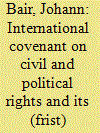

|
|
|
|
|
| Publication |
Frankfurt am Main, Peter Lang, 2005.
|
| Description |
x, 212p.
|
| Contents |
A short commentary based on views, general comments and concluding observations by the Human Rights Committee
|
| Standard Number |
3631542194
|
|
|
|
|
|
|
|
|
|
|
|
Copies: C:1/I:0,R:0,Q:0
Circulation
| Accession# | Call# | Current Location | Status | Policy | Location |
| 050278 | 341.48/BAI 050278 | Main | On Shelf | General | |
|
|
|
|
| 19 |
ID:
126695
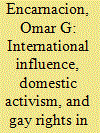

|
|
|
|
|
| Publication |
2013.
|
| Summary/Abstract |
IN JULY 2010, ARGENTINA BECAME THE FIRST NATION in Latin America, and only the second one in the developing world after South Africa, to pass a law legalizing same-sex marriage; shortly thereafter, the country enacted what is arguably the most progressive transgender law of any country in the world. It allows for a change of gender without undergoing surgery or receiving authorization from a doctor or a judge. Both laws have put Argentina in a select group of nations regarded as being on the cutting edge of gay rights and atop international rankings of countries most open to issues of concern to the lesbian/gay/bisexual/transgender (LGBT) community, such as the recently developed "Gay Friendliness Index."1 Neither societal factors nor political conditions could have predicted this cascade of gay rights advances.
|
|
|
|
|
|
|
|
|
|
|
|
|
|
|
|
| 20 |
ID:
116554
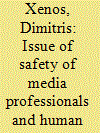

|
|
|
|
|
| Publication |
2012.
|
| Summary/Abstract |
Attacks against media professionals and human rights defenders do not only harm the individual victim but the whole society. In the system of the UN Human Rights Committee (HRC), the issue of the legal protection of these groups of individuals has essentially been equated with the protection of the main civil forces which influence domestically the achievement of the democratic values and objectives that are enshrined in the International Covenant on Civil and Political Rights. In the supervision of a State's compliance with the treaty, the HRC builds on and expands its existing jurisprudence on violence against the individual by increasingly developing and improving a multilevel framework of the State's obligations that extend to critical procedural safeguards. Given the stakes involved, the legal protection of media professionals and human rights defenders has become a key case-study of effectiveness and rigour of every international law system of human rights.
|
|
|
|
|
|
|
|
|
|
|
|
|
|
|
|
|
|
|
|
|